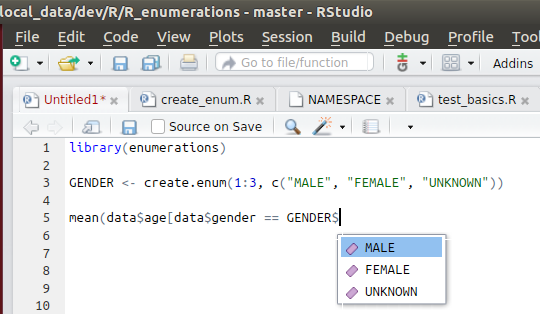This package adds a dynamic enumeration data type to the R programming language
An enumeration is a data type that consists of a set of named values (value/name pairs) to restrict the allowed values and support using self-explanatory names instead of magic values in the code.
"Dynamic" means the enumeration values cannot only be declared at "compile" (design) time but also during run-time (e. g. from a database).
For a good definition and background information about enumeration types see wikipedia:
https://en.wikipedia.org/wiki/Enumerated_type
Enumerated types
- make the code more self-documenting by using self-explanatory constant names instead of "magic" values
- reduce the risk of passing wrong actual parameter values to functions via validation against the list of allowed values of the enumeration
- make coding easier if the IDE supports code completion (e. g. RStudio) by presenting the list of allowed names in the editor
To install the package using the most-recent (development) source code from github you can use the package devtools:
# install.packages("devtools")
devtools::install_github("aryoda/R_enumerations")If you want to install only a more stable (pre-)release version to avoid depending on an ever-changing development version you can use the Git tag name of the release, e. g.:
devtools::install_github("aryoda/R_enumerations@v0.3.0-beta")`For a list of available (pre-)releases see https://github.com/aryoda/R_enumerations/releases
For details on how to install specific version numbers see: https://cran.r-project.org/web/packages/devtools/vignettes/dependencies.html
There are different ways of creating an enumeration object:
library(enumerations)
# This is the easiest way to create an enumeration (if the enum values are not important)
DRINKS <- create.enum(c("COFFEE", "TEA", "SOFT DRINK"))
# This is the most intuitive way of creating an enumeration to create names of meaningful values
COLOR.ENUM <- create.enum(c(BLUE = 1L, RED = 2L, BLACK = 3L))
# You can specify the values and names separately (e. g. if they come from a CSV file or database table)
COLOR.ENUM <- create.enum(c(1L, 2L, 3L), c("BLUE", "RED", "BLACK"))library(enumerations)
# "magic numbers" vs. a self-explanatory enumeration --------------------------------------------------------------
data <- data.frame(gender = c(1, 2, 1, 3, 4, 2), age = c(50, 40, 10, 10, 18, 25))
GENDER <- create.enum(1:3, c("MALE", "FEMALE", "UNKNOWN"))
# Example with a "magic number" (what does "1" mean?):
mean(data$age[data$gender == 1])
# Same example with an enum that makes the meaning explicit:
mean(data$age[data$gender == GENDER$MALE])
# check against allowed values to find invalid data ---------------------------------------------------------------
data[!(data$gender %in% GENDER),]
# gender age
# 5 4 18You can use an enumeration as data type of a function parameter
- to document the allowed values of a function parameter and
- check the passed actual parameter value against the list of allowed values
- support optional parameters (the first enum value is the default value then)
library(enumerations)
GENDER <- create.enum(1:3, c("MALE", "FEMALE", "UNKNOWN"))
life.expectancy <- function(x = GENDER) {
x.value <- match.enum.arg(x) # validate against allowed values and pass the default value if no value was passed
if (x.value == GENDER$MALE)
return(78)
if (x.value == GENDER$FEMALE)
return(80)
return(NA)
}
life.expectancy() # uses the first element of the enum as default value!
# [1] 78
life.expectancy(GENDER$MALE)
# [1] 78
life.expectancy(GENDER$FEMALE)
# [1] 80
life.expectancy(GENDER$UNKNOWN)
# [1] NA
life.expectancy(1) # passing the value is not the recommended way, but also works
# [1] 78
life.expectancy(4) # passing the value is not the recommended way... because you may use invalid values
# Error in match.enum.arg(x) :
# 'arg' must be one of the values in the 'choices' list: MALE = 1, FEMALE = 2, UNKNOWN = 3
life.expectancy("male") # names as strings do not work directly
# Error in match.enum.arg(x) :
# 'arg' must be one of the values in the 'choices' list: MALE = 1, FEMALE = 2, UNKNOWN = 3
life.expectancy(GENDER[["MALE"]]) # names as strings must use the usual double-bracket syntax
# [1] 78
gender <- "MALE"
life.expectancy(GENDER[[gender]]) # a string in a variable must also use the double-brackets
# [1] 78Note that currently there is no support for another than the first enum value as the default value in case of a missing actual parameter.
Using an enum type does also enable code completion in RStudio (and other IDEs):
If you want to use this package in your own packages you have to declare the dependencies in the
DESCRIPTION file and add a remote dependency to the github location:
Imports: ...,
enumerations
Remotes: github::aryoda/R_enumerations
You can then use enumerations as regular dependency in the Depends, Imports, Suggests
and Enhances keys of the DESCRIPTION file.
Remotes is an extension known only by the devtools package.
This means that the remote dependency does not cause the automatic installation of the referenced package
except your are using the devtools functions like install for your package.
Otherwise you still have to install it manually before building your package.
For details see:
- https://stackoverflow.com/questions/30493388/create-an-r-package-that-depends-on-another-r-package-located-on-github
- https://cran.r-project.org/web/packages/devtools/vignettes/dependencies.html
Note: You cannot publish a package at CRAN that contains a Remotes key in the DESCRIPTION file.
TODO
- public enum via roxygen2/namespace export + Documentation
- FQN in function signatures
- always pass second parameter with enum name to
match.enum.argto avoid problems if the default value is an expression (e. g.options)
